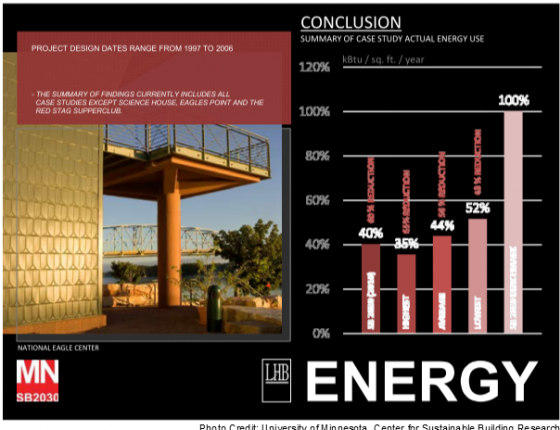Update: October 2022
In early 2023, CEE will be leading an updated evaluation of SB 2030’s threshold for cost-effectiveness, currently set at a 12-year payback. This evaluation will be based on updates in state guidelines in response to the ECO Act, as well as updated cost information that will be used in utilities’ next round of the Conservation Improvement Program filings. The volume of project reviews under SB 2030 will be expanding as more policies and ordinances are requiring buildings to follow SB 2030.

Overview
Residential and commercial buildings comprise over 40 percent of US energy consumption, according to the Energy Information Administration. The energy savings potential of improved building design motivated the non-profit organization Architecture 2030 to challenge the building community to adopt aggressive building energy performance targets that increase every 5 years, culminating in all new buildings being carbon-neutral in 2030. To date, over a thousand design firms and government groups have adopted the targets.
In 2008, the Minnesota Legislature designated the Center for Sustainable Research at the University of Minnesota to develop state-specific performance targets modeled after Architecture 2030. Sustainable Building 2030’s (SB2030) energy efficiency standards emphasize measurable whole building energy performance standards for new construction and major renovations of commercial buildings. While energy codes tend to emphasize specific building and equipment options, the SB2030 Energy Standards are performance based. Therefore, economic and environmental benefits can be verified through review of metered data, and design teams have the flexibility to choose the most cost-effective approach for their specific building type and location. SB2030 efforts provide a framework to encourage and assist building design teams to incorporate SB2030 standards and receive recognition for verified projects.
The SB2030 Energy Standards for design and ongoing monitoring are required by state law for projects that receive state bonds. They have also been adopted by a number of local government entities and are being incorporated into utility energy efficiency programs. As a member of the SB2030 Consultant Team and Steering Committee, CEE helped shape the development of the standards and the ongoing implementation of various project efforts to make the process of using the standards as rigorous, clear and streamlined as possible. CEE has taken a lead role in the following areas:
- Confirming that the SB2030 Energy Standard performance levels can be achieved cost-effectively for a wide variety of buildings.
- Developing technical and submittal requirements for various design phases of SB2030 projects, including a building strategy checklist, building performance evaluation guide and metering requirements.
- Performing technical reviews of individual projects through successive design stages.
- Creating a “prescriptive” option for small buildings that gives clear guidance to design teams and provides a cost-effective alternative to performing whole building energy simulations.
CEE also works with utilities to develop and implement programs that support the the SB2030 Energy standards. This includes design assistance and modeling, preliminary cost-effectiveness analysis, and verification of proper installation of design components.
